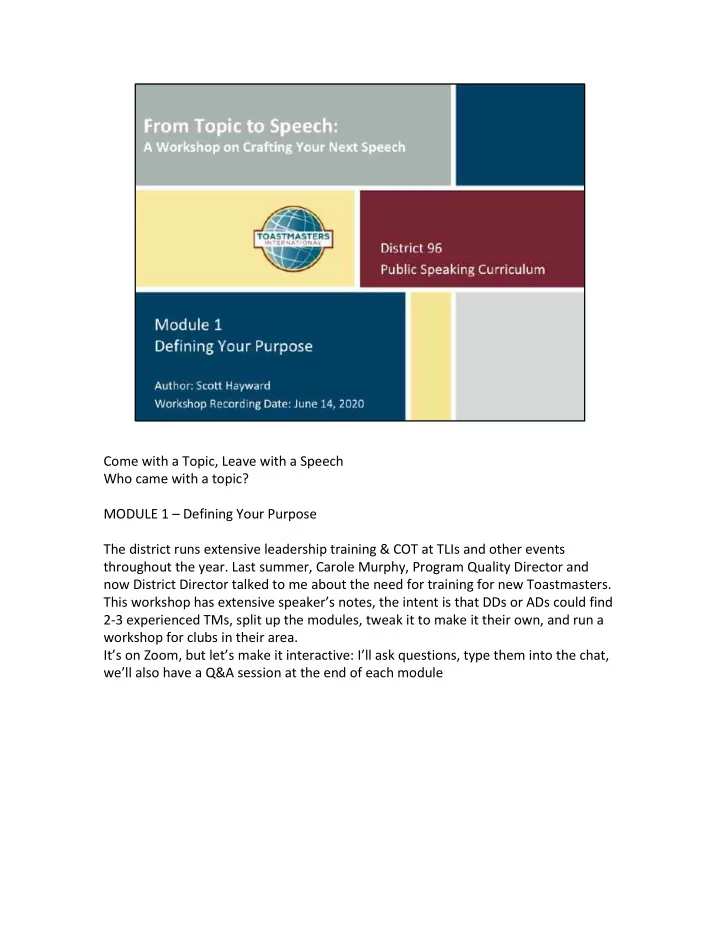

Come with a Topic, Leave with a Speech Who came with a topic? MODULE 1 – Defining Your Purpose The district runs extensive leadership training & COT at TLIs and other events throughout the year. Last summer, Carole Murphy, Program Quality Director and now District Director talked to me about the need for training for new Toastmasters. This workshop has extensive speaker’s notes, the intent is that DDs or ADs could find 2-3 experienced TMs, split up the modules, tweak it to make it their own, and run a workshop for clubs in their area. It’s on Zoom, but let’s make it interactive: I’ll ask questions, type them into the chat, we’ll also have a Q&A session at the end of each module
Instructor’s Notes: Who has a speech in mind? The primary goal for today is for participants to generate ideas that will take their concept into a well-crafted speech. The first two point are how we hope to achieve that goal. 2
Instructor’s Notes: 3
Instructor’s Notes: Ask: does anyone know what this is? It’s not a dolphin… 4
Instructor’s Notes: It’s a porpoise. It’s important to be clear about your porpoise. Wait! this is the wrong slide, we’re not here to talk about your porpoise… 5
Instructor’s Notes: Before you do anything, define your speech purpose. You’re about to take 5-7 minutes out of 20 (200? 2000?) peoples’ lives, be clear about what you want to accomplish. A clear purpose acts as a compass to keep you on track as you write. If you communicate it clearly, it will keep your audience on track as you deliver your speech. Ask “What do you want the audience to walk away with?” That’s your purpose. 6
7
Instructor’s Notes: Why is a clear speech purpose important? So you can ensure that you communicate one clear message or central theme to the audience. The key message here is that having an explicit purpose helps you decide what to include and what to exclude from a speech. You may come up with good ideas that could be used in ANOTHER speech. Scott’s story: I wrote a lot of 10-12 minute speeches when I started at Toastmasters. Writing a single sentence purpose is how I was able to pare them down to 7 minutes, anything that did not directly support the purpose went in a future speech idea list. But it didn’t belong in this one. 8
Instructor’s Notes: Describe the need to be clear what the general purpose is (there may be two of them) as well as the specific purpose. A great speaker will bring something of themselves into the speech—a story or perspective. It’s their speech, after all. If anyone could deliver it, you might as well write it down and email it! Provide some examples of each type: Inform: “I want people to know how to • develop an effective fitness program” Persuade: “I want people to see the health • benefits of exercise and persuade them to hire a fitness coach” Entertain: “I want people to enjoy laughing • at my journey from being unfit to getting fit” Inspire: “I want people to go out and • 9
improve their health by starting a fitness program” Unique perspective: if I deliver one of your speeches, it won’t be the same as if you deliver it. It’s your speech, your perspective, and only you can represent that. Make sure you inject your unique view on the subject matter. 9
10
Instructor’s Notes: It’s not about YOU! The key message is to emphasize the need to make the speech about the audience, NOT the speaker. So even if they have their own perspective, imagine being an audience member and how THEY will receive the speech. Scott’s story: Maybe talk about how GCA drilled the client-centric approach into our consultants 11
Instructor’s Notes: The key message is that a speech should prompt the audience to walk out with a new idea, perspective or emotion they didn’t have coming in. To accomplish this consistently, consider deciding what change you want to invoke before you write the speech. 12
Instructor’s Notes: The audience should walk away changed: with a different perspective on something, an emotional response, motivated to take a new action, or a combination of those. What is the change you want to invoke? Scott’s story: Lots of story potential here about speeches that have motivated me: like Andrew or Stefano's district-winning speeches. 13
14
Instructor’s Notes: Put some takeaways into the chat 15
16
Recommend
More recommend